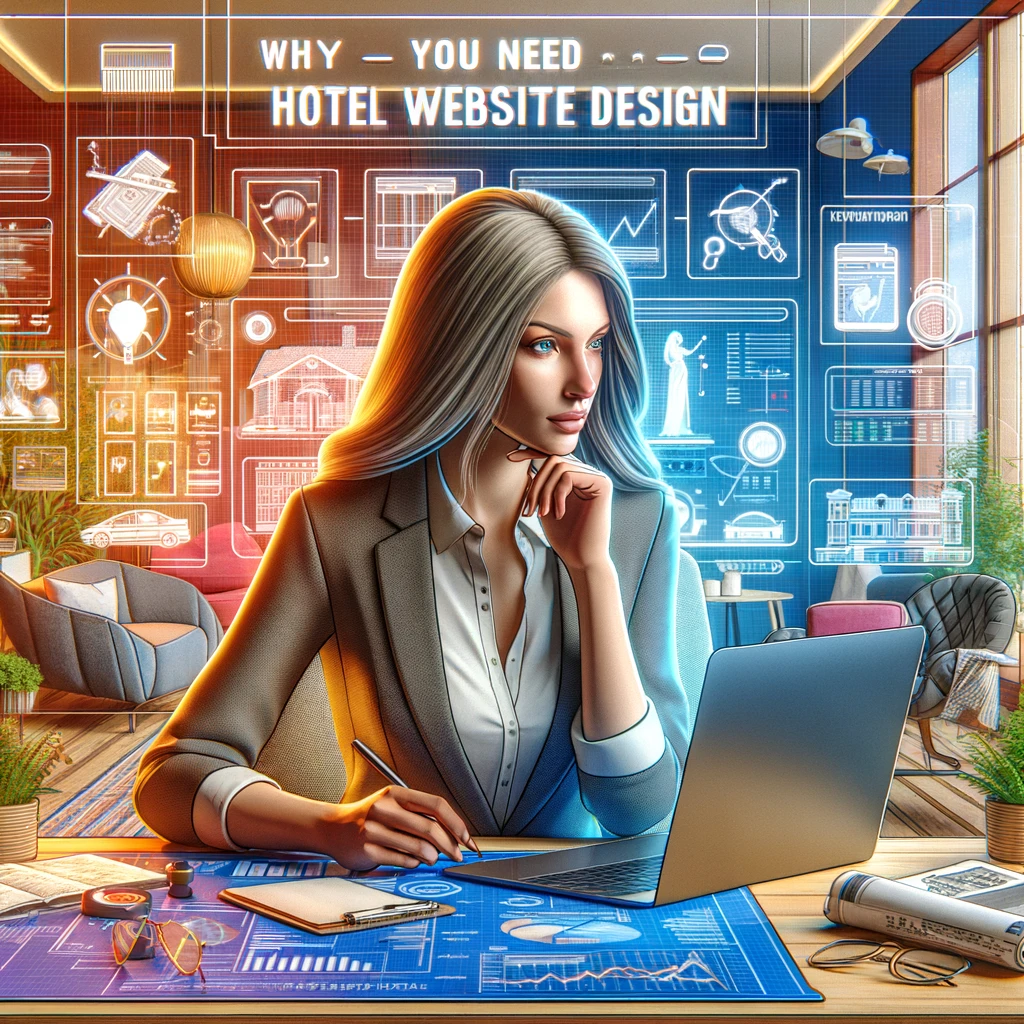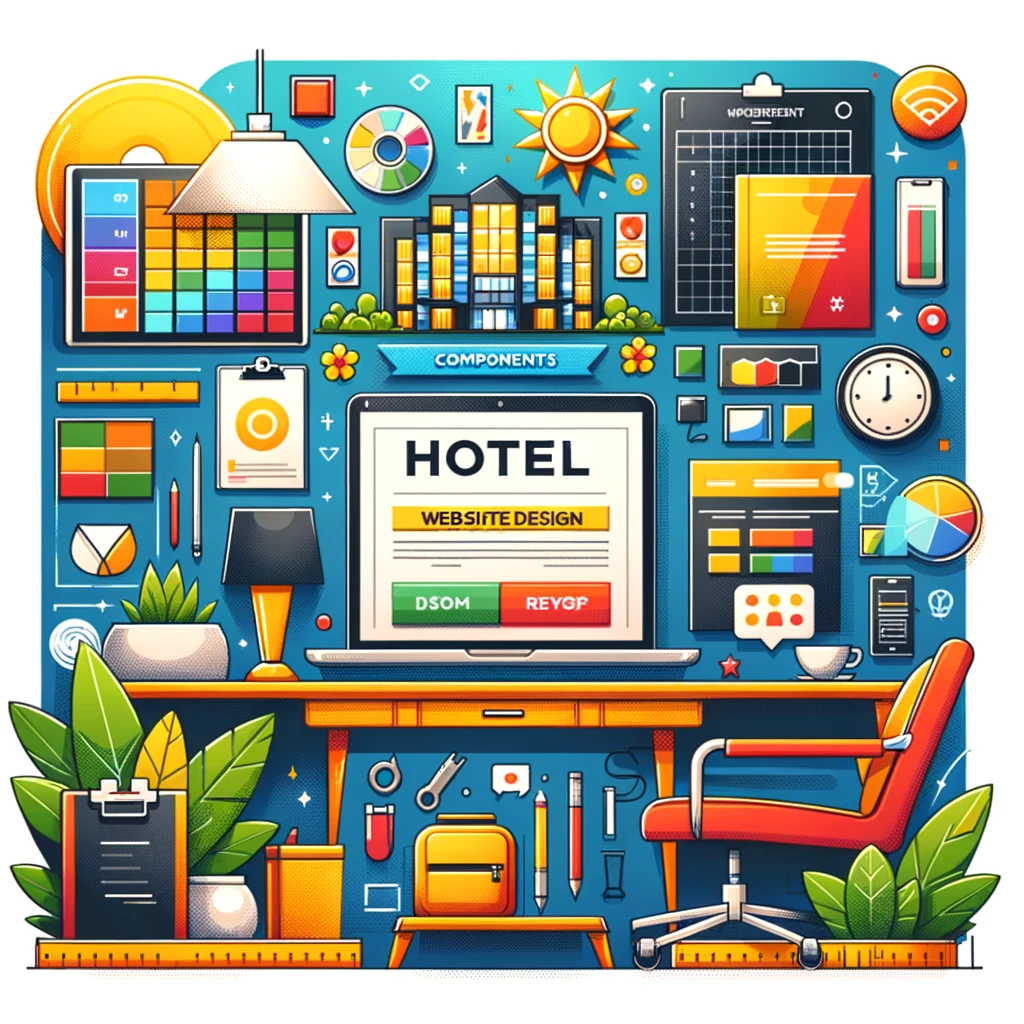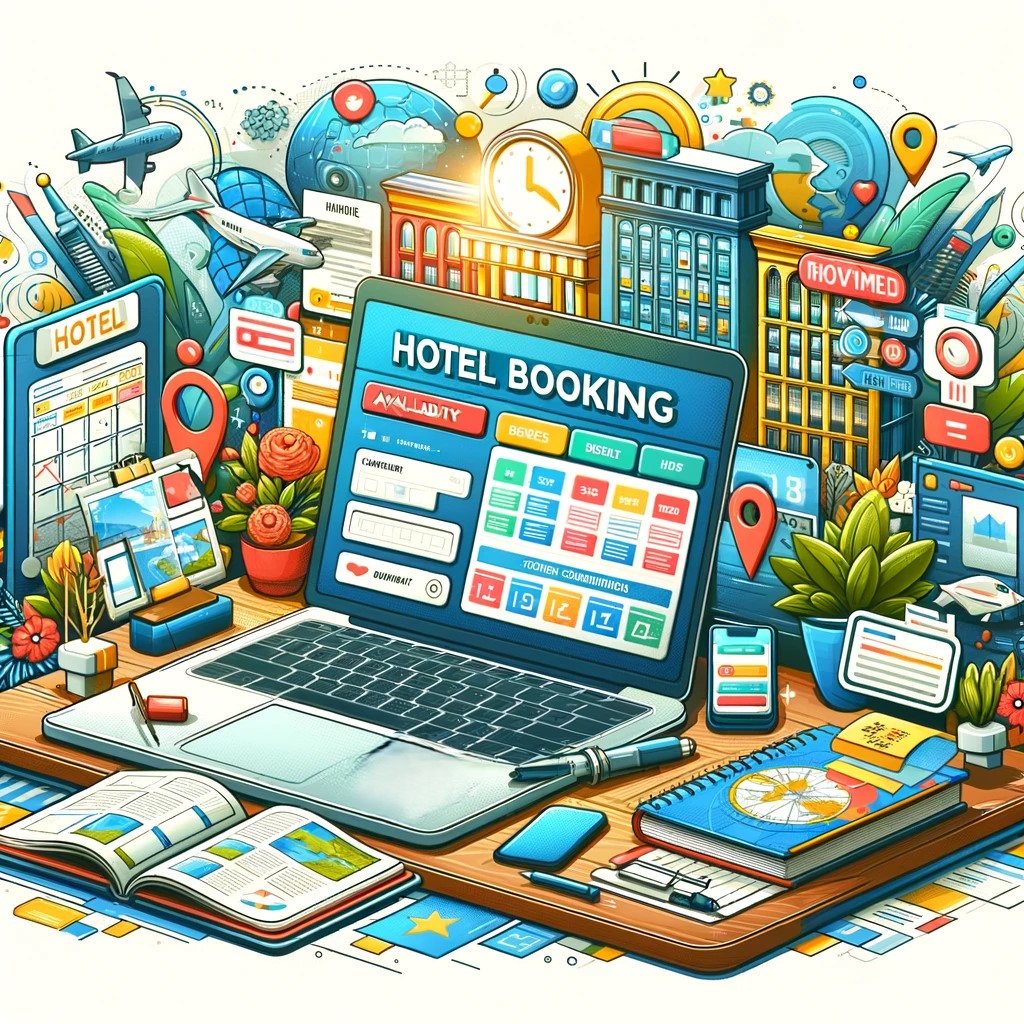A hotel website design includes the layout, structure, and visual elements of a website customised to showcase your rooms, amenities, bookings and services.

Introduction
Consider a few essentials before designing a website design for your hospitality business, such as:
- Why you need a hotel website design
- Components of a hotel website design
- Factors to consider in a hotel website design
A neat hotel website design benefits your brand in different ways, allowing you to remain relevant in the eyes of search engines. The design also needs to work well when searchers are looking for a good night sleep.
Why a Good Hotel Website Design is Important
A hotel website design is a powerful marketing tool that can drive bookings, promote guest experiences, and strengthen your brand presence in the competitive hospitality industry.
It serves as the virtual front door to your bnb, guest house, hostel or Airbnb. It is the first point of contact potential guests have with your brand. Here’s why it’s essential:
First Impressions for your Hotel Website Design
Your website is your digital storefront. A well-designed website creates a positive first impression, enticing guests to explore further and potentially book a stay.
- Capturing Attention: A great design instantly grabs visitors’ attention. Its appealing visuals, clear navigation, and attractive content make a positive first impression. This helps in pulling customers to your property.
- Building Trust: A professional and user-friendly style instils trust in potential guests. This signals the hotel’s commitment to quality and service excellence from the very start.
- Improved User Experience: A good layout and easy access to essential information like room details, amenities, and booking options lets guests have a seamless and enjoyable experience, setting a positive tone for their interaction with your hotel.
Hotel Website Design Accessibility

A hotel website design provides easy access to essential information like room availability, rates, location, and contact details.
This convenience can lead to more bookings. Satisfied guests will be interested in spending their time at your establishment.
- Inclusivity: An inclusive hotel website certifies that individuals with disabilities can navigate, book, and relate to the site content effectively. It demonstrates a commitment to diversity, equality, and inclusion.
- Improved User Experience: Accessibility features such as alt text for images and keyboard navigation benefit users with disabilities. They also improve the overall user experience for all visitors, leading to higher satisfaction and retention rates.
- Legal Compliance and Reputation: This shows compliance with accessibility laws and regulations, safeguarding against potential legal issues and promoting reputation as a socially responsible business.
Hotel Website Design that Allows Direct Bookings
A hotel website allows guests to book directly, bypassing third-party booking platforms that charge commissions. Direct bookings maximise revenue for your property.
- Increased Revenue: Direct bookings on a hotel website cut out third-party commissions. This promotes more profit retention per reservation.
- Improved Control: Your business can shape promotions, loyalty programs, and personalised offers directly on the website. This maintains control over branding and customer experience.
- Data Ownership and Insights: Website bookings provide valuable data on guest preferences and behaviours. It empowers your business to refine marketing plans and enrich guest satisfaction using targeted approaches.
Brand Representation with Hotel Website Design

A hotel website design is an extension of your brand identity. A well-designed site reflects your brand’s personality, values, and commitment to hospitality, helping to build trust and loyalty among guests.
- Consistent Brand Identity: A well-created hotel website attests that your brand’s identity, including logo, colour schemes, and messaging, remains consistent across all online touch points. This reinforces brand recognition and trust among potential guests.
- Customised User Experience: Design elements such as imagery, layout, and language can evoke the desired emotions and associations that align with the brand’s image. It provides your visitors with a unique and memorable browsing experience.
- Brand Storytelling: An effective website look allows your hotel to narrate its story effectively. It showcases its unique features, amenities, and values, which helps to differentiate it from your competitors and build a stronger connection with the target audience.
Search Engine Visibility
A properly modified hotel website design can improve your visibility in search engine results. This also makes it easier for potential guests to find you online.
- Increased Traffic: A website refined for SEO attracts more organic traffic from search engines. It leads to a higher volume of potential guests visiting your site.
- Enriched Brand Exposure: Higher visibility in search engine results positions your hotel brand in front of a larger audience. It improves brand recognition and exposure within the competitive hospitality industry.
- Cost-Effective Marketing: SEO-driven visibility provides a cost-effective marketing channel, as organic search traffic doesn’t require ongoing payments for each click or impression, unlike paid advertising methods.
Components of a Hotel Website Design

A hotel website design consists of several primary components aimed at providing users with a seamless browsing and booking experience.
The homepage serves as the virtual front desk, offering an inviting introduction to the hotel’s brand identity, showcasing stunning visuals of the property, and featuring essential navigation elements such as menu options, search bars, and call-to-action buttons for reservations.
Homepage
This is the first page visitors see when they land on your website. It usually features stunning images of the hotel, a welcoming message, and quick links to important sections like room reservations, amenities, and special offers.
- Welcoming Visuals: Attractive images showcasing your hotel’s ambiance, amenities, and surroundings. This entices visitors to explore further.
- Clear Navigation: Appealing menu structure. It allows easy access to important sections such as room bookings, dining options, and special offers of your Airbnb, guest house, hostel or BNB.
- Call-to-Action: Prominent buttons prompt users to book now or explore special packages. These features on your hotel website design encourage immediate attraction and conversion.
Navigation Menu
An intimate menu bar helps users easily navigate to different sections of your hotel, hostel, guest house, BNB or Airbnb website such as rooms, dining, amenities, location, contact, and booking.
- Clear and Intuitive: The navigation menu of your site should be designed in a way that makes it easy for users to find what they’re looking for quickly and effortlessly. This entails logical grouping of menu items and straightforward language.
- Reflective of Hotel Offerings: The menu should reflect the various services, amenities, and sections of your web page, such as accommodations, dining options, amenities (like spa or pool), events, and booking information.
- Accessible Across Devices: Whether viewed on a desktop, tablet, or mobile phone, the navigation menu should adapt responsively to secure seamless access to all sections of your hotel website, maintaining functionality and ease of use across different screen sizes and devices.
Room Listings
A dedicated section showcasing the types of rooms available, along with descriptions, amenities, and prices. High-quality images and virtual tours are often included in your website design to give potential guests a glimpse of the accommodations.
- Visual Appeal: The room listing should feature high-quality images of each room, showcasing different angles and amenities to entice potential guests.
- Concise Information: Each room listing should provide necessary details such as room type, price, occupancy limits, and included amenities in a clear and easily scannable format.
- Booking Integration: Smooth integration with the booking system allows users to check availability, select dates, and complete reservations directly from the room listing page, enriching user experience and conversion rates.
Bookings

An integrated booking system allows visitors to check availability, make reservations, and manage bookings directly through the website.
- Integration: A booking system integrates into your hotel website effortlessly. It provides a direct channel for guests to make reservations without leaving the site.
- Functionality: It also offers user-friendly features such as date selection, room type options, pricing details, and real-time availability updates.
- Customisation: You have a chance to customise the booking system of your website to reflect your brand identity. Include promotional offers and gather guest preferences for a personalised booking experience.
Location, Directions and Contact Information
Maps, directions, and information about nearby attractions or points of interest on your hotel website can help guests plan their stay and explore the area.
This also entails clear and visible contact details including phone numbers, email addresses, and a contact form for inquiries or assistance. Links to your business social media profiles allow visitors to get attracted and stay updated on news, events, and promotions.
Location offers transportation options from major transportation hubs like airports or train stations
- Directions provide clear, step-by-step directions from primary points of arrival (e.g., airports, major highways).
- Contact information features prominent contact details, including phone number, email address, and physical address.
Factors to Consider in Hotel Website Design
Creating a hotel website design involves several needful factors to certify it effectively attracts guests and converts visits into bookings. Here are some primary considerations:
User Experience (UX)
Your hotel website should be easy to navigate. It should also have clear menus, intuitive layouts, and fast loading times.
Users should quickly find the information they need, such as room rates, amenities, and booking options.
- Smooth Navigation: Stress free easy access to vital information such as room rates, amenities, and booking options. This minimises clicks and provides clear pathways for users to find what they need effortlessly.
- Visual Appeal: Use high-quality images, pleasing colour schemes, and a clean layout to create an inviting atmosphere that reflects your hotel’s brand and entices visitors to explore further and make reservations.
Mobile Responsiveness
With the increasing use of mobile phones for travel booking, your hotel website design must be improved for portable devices. It should adapt easily to different screen sizes and resolutions.
- Improved user experience: Mobile responsiveness allows visitors accessing your website on the move to have an improved browsing experience. This leads to higher attraction and satisfaction.
- Improved accessibility: Having a responsive design certifies that it is accessible to a wider audience, regardless of the device they use.
- Competitive advantage: A responsive website can set your hotel apart from competitors by demonstrating a commitment to modernity, convenience, and customer-centric design. This potentially leads to increased bookings and revenue.
Visual Appeal

High-quality images and videos of your hotel, guest house, hostel, and nearby attractions can create a convincing visual experience and help visitors envision their stay at your establishment.
- Imagery: High-quality images of your hotel, guest house, Airbnb, and surrounding areas elicit a sense of luxury and comfort. This entices guests to explore further.
- Layout and Design: A clean layout of your design with visually appealing fonts, colours, and graphics creates a positive user experience and reflects your branding and style.
- Consistency and Cohesion: Consistent design elements throughout the website, such as colour schemes and typography create a cohesive visual identity. This promotes the overall appeal and professionalism of your site.
Booking Functionality
The booking process should be simple, secure, and prominently featured on your hotel website design. Provide clear calls-to-action (CTAs) for booking, and consider offering incentives for direct bookings, such as exclusive discounts or perks.
- User Experience Improvement: Booking functionality streamlines the reservation process, offering users a convenient and efficient way to secure accommodations directly from the hotel’s website.
- Increased Conversion Rates: Integrating seamless booking features, your guest house, hotel, hostel or Airbnb can capitalise on impulse bookings and drive higher conversion rates as users find it easier to make reservations instantly.
- Brand Loyalty and Trust: Providing a reliable booking system fosters trust among customers. It encourages brand loyalty as researchers perceive your hotel, guest house or hostel as reliable and professional, thus more likely to return for future stays.
SEO for Hotels

Apply SEO best practices to improve your site’s visibility in search engine results. This includes using relevant keywords, improved meta tags, and creating unique, attractive content on your hotel website.
- Keyword Improvement: Make sure your content integrates relevant keywords related to the hotel’s location, amenities, and services to improve search engine visibility.
- Mobile-Friendly Design: Use responsive design to promote accessibility and user-friendliness across various devices. Mobile compatibility is a significant factor in search engine rankings.
- Quality Content Creation: Develop high-quality, informative content such as blog posts, destination guides, and multimedia pieces to attract users and upgrade the website’s authority, attracting organic traffic and improving SEO performance.
Conclusion
Having a well-thought-out hotel website design is a necessity for thriving in the competitive hospitality industry. A well-designed website serves as the virtual front door to your hotel. It offers your brand a wide range of benefits such as;
- Offer potential guests a glimpse into the experience they can expect
- Establish credibility and trust among potential guests
- Showcase your professionalism and commitment to providing exceptional service
Investing in a creative hotel website helps you to keep up with the trends; it’s about staying ahead of the curve and making sure your property stands out in a crowded hospitality marketplace.
If you liked this article, then please subscribe to our YouTube Channel for video tutorials and more. You can also find us on LinkedIn, Twitter and Pinterest.




